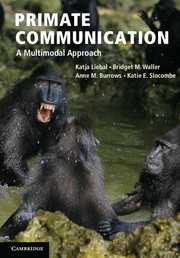Book contents
Preface
Published online by Cambridge University Press: 05 December 2013
Summary
Why this book? An anecdote
In 2006, some of the authors attended a conference on the Evolution of Language. There were a considerable number of talks that reported results from comparative research on nonhuman primates and how this might inform research into the origins of human language. However, although each of us was working on primate communication, we rarely met at this conference. Each of us attended the sessions according to her (modality specific) expertise, while largely ignoring presentations related to other modalities. Since, it has become more and more apparent to us that isolating communicative modalities is a common practice across the field of primate communication, regardless of whether the overarching research question is the same.
This conference gave the crucial impetus for this book. Writing it was a fascinating, though challenging process: each of us with a background of research in one particular modality, had her own perspective on primate communication, and a corresponding bias regarding the other modalities. After writing this book, this has fundamentally changed. Of course, each of us is still an expert in ‘her’ modality and there are still many open questions and some debates remain unsolved. Writing this book has, however, changed our perspectives not only on other modalities, but also raised our awareness in regard to open questions or pitfalls in our own respective areas of expertise.
- Type
- Chapter
- Information
- Primate CommunicationA Multimodal Approach, pp. ix - xiiPublisher: Cambridge University PressPrint publication year: 2013



